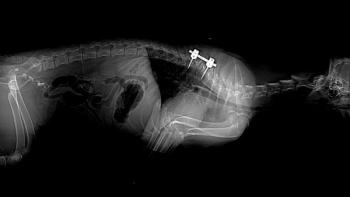
Brain infarction in canine patients
Although brain infarction is the third leading cause of death in humans, cerebrovascular accidents are rarely reported in veterinary literature.
Although brain infarction is the third leading cause of death in humans, cerebrovascular accidents are rarely reported in veterinary literature.
More recently, with the increasing availability of advanced diagnostic modalities such as MRI, brain infarction is more readily diagnosed ante-mortem.
It is well understood that the brain is dependent on a sufficient blood flow for its high metabolic demand. If cerebral blood flow (CBF) decreases below a certain threshold, electrical disturbances, rapidly followed by cellular homeostasis problems, develop in the central nervous system (CNS), leading to cell death.
Short (less than 24 hours in humans) episodes of focal insufficient blood flow lead to transient ischemic attacks (TIA). If this short-lasting episode diffusely affects the entire brain, the term syncopy is used.
Severe, prolonged (more than 24 hours in humans) focal insufficient blood flow constitutes "stroke" in humans. If the long-lasting reduction in CBF extends to the entire brain, the term global ischemia is applied (Table 1).
Table 1
In clinical practice, the veterinarian often faces the above-mentioned vascular CNS disturbances. Syncopy commonly results from cardiac disorders, and global ischemia may be secondary to CPA during anesthesia. This review focuses on TIA and the long-lasting focal brain infarction, stroke.
Transient ischemic attacks in humans are short neurological disturbances, characterized by dizziness, nystagmus and ataxia. In a veterinary literature reviewing of 12 dogs with presumed cerebellar vascular accidents, five dogs had episodes of acute neurological signs lasting less than 10 minutes. Several of these patients were described to have experienced seizures by referring veterinarians, although the signs resembled acute vestibular episodes.
Long-lasting focal cerebrovascular disturbances (stroke, infarction) are now well described in veterinary medicine. The pathogenesis of stroke in dogs remains an area of research.
A major category of diseases affecting the blood vessels in humans leading to stroke is atherosclerosis. There was no dog diagnosed with atherosclerosis among the 33 dogs in one study with brain infarction.
Hypertensive encephalopathy is another leading cause of stroke in humans. In dogs, chronic hypertension may develop secondary to glomerular disease. Chronic kidney disease was diagnosed in eight out of the 33 dogs with stroke.
Furthermore, three dogs with hyperadrenocorticism, and one dog with pheochromocytoma exhibited hypertension among the dogs with stroke. There was no link identified in dogs between heart disease and brain infarction (unlike the case in humans). In the same study, a hypercoagulable state was found in nine dogs. Underlying diseases included hyperadrenocorticism, protein-losing nephropathy and neoplasia.
The primary treatment of cerebrovascular disease is to deliver adequate tissue oxygenation. In some countries, hyperbaric oxygen therapy (HBOT) for cerebrovascular disease is part of the accepted treatment protocol. HBOT is now being described in veterinary practice.
Beatrix Nanai
In summary, dogs with a sudden onset of non-progressive CNS signs may be experiencing a cerebrovascular accident, and patients with underlying diseases such as kidney disease and hyperadrenocorticism may be at increased risk of cerebrovascular disease.
Ronald Lyman
Dr. Nanai is a resident of the European College of Veterinary Neurology/Neurosurgery at the Animal Emergency and Referral Center in Fort Pierce, Fla.
Dr. Lyman is a graduate of The Ohio State University College of Veterinary Medicine. He completed a formal internship at the Animal Medical Center in New York City. Lyman is a co-author of chapters in the 2000 editions of Kirk's Current Veterinary Therapy XIII and Quick Reference to Veterinary Medicine.
Newsletter
From exam room tips to practice management insights, get trusted veterinary news delivered straight to your inbox—subscribe to dvm360.





